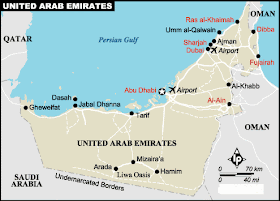
Good morning people ^_^
Today I have gathered some information from my German friends that I met through the workshop. Follows are some thoughts they had about us in the United Arab Emirates before they arrived:
- Much oil
- Little BRAIN!!
- Little diversification of economy
- Strict towards women
- Copied culture as in movies, theatre, arts
- Giant building projects, which is against the environment
- Almost nothing about the UAE
- Missing hestorical buildings
- Skyscrapers in the desert
- Unbearable heat in the summer and living in air-conditioned hotels and malls.
After the workshop and after their short visit to the UAE, some of their thoughts have changed, such as:
- The most important thing was to get to know individual people rather than knowing these prejudices about "an average of one million"
- Surprised to see local talent, arts, interest in fashion
- Realized that a black traditional "Abaya" can exist in hundreds of trendy fashions- so SORT OF NOTICING LITTLE THINGS THAT ARE IMPOSSIBLE TO SEE FROM FAR AWAY! (Which is why we will exchange visits Insha-Allah).
- It became evident that in my areas there's much to criticize but not always a real alternative- so it's easy to be an arrogant westerner and criticise but much more difficult to try to see where there's still room to facilitate a better transition.
- Bearing with traditions and keeping them up
- Taking pride in customs, clothes and behaviour is much more chosen than prescribed
- UAE in front as the "New Arabia"
- Each emirate has its special development
- UAE as a politically stable country in a very unstable and possibly dangerous region (Iran, Iraq, etc).
And here are some points that they still want to learn more about:
- How is the situation for women in the UAE?
- What about gender equality?
- What is the difference between each emirate?
- How is it possible that the UAE seem so modern and open in comparison to other Arab countries? and do they see themselves as role models?
- Where are the difficulties? too much melting pot versus own identity?
- What is the UAE doing to preserve its culture?
- How is life in people's homes at times when there are no guests?
- What about science and education in the UAE?
- What do people here like to learn more about?
- What would they want us to learn from them?
- More about Islam
- More about relations between men and women
- How it is not to have a time of foolish youth
- How eager the Emiratis to gain more political participation
- How big is the influence of Islam on political decisions?
- What do women and also men think about the "Abaya"? would they sometimes want to change the obligation? or do they like it?
- What is the percentage of arranged marriages?
- Do expats feel discriminated without the chance to get an Emirati passport?
Of course all of the above are just a little bit of what Westerners may want to know about us or already know about us and about our beloved country. That is why I have started this blog to answer your questions and tell you more about us, my country and my religion hoping that I change many things and strengthen relations between all of us all over the world.
The first thing I am going to do is introduce you to my country and its seven emirates.
Dont go so far ;) I will be back with more information.
Sarah






















